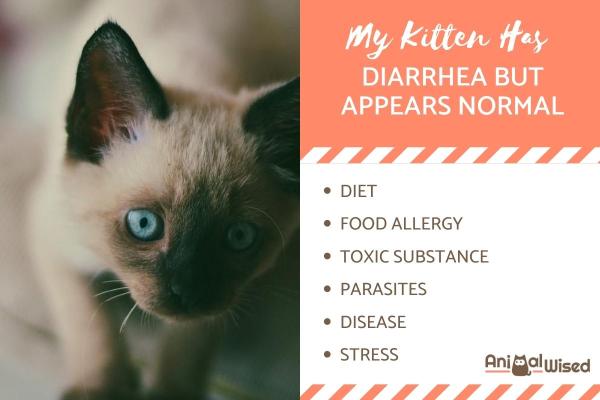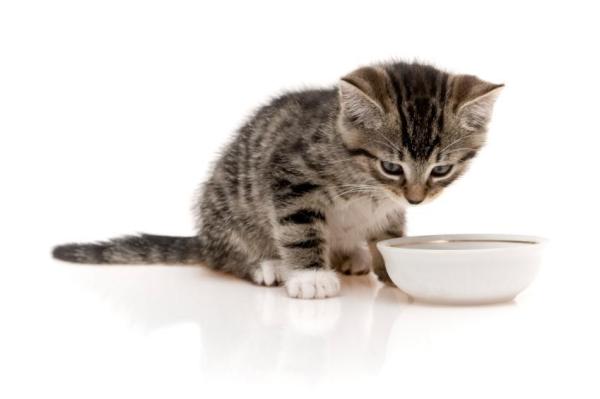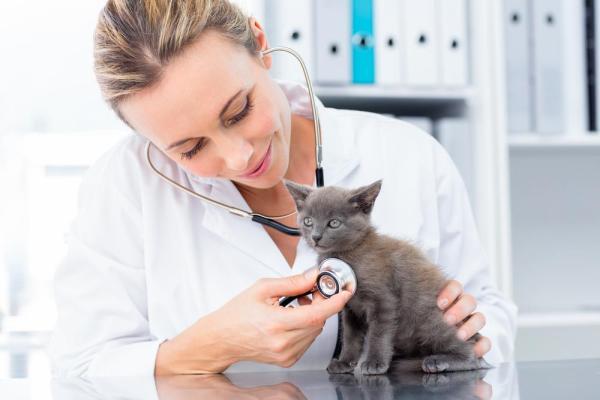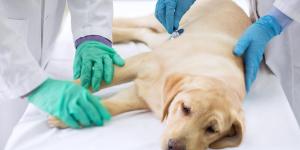My Kitten Has Diarrhea But Acts Normal Otherwise



See files for Cats
Due to a kitten's rapid development, any sign of illness needs to be addressed seriously. If we do not address any problems promptly, it is possible their development will be stunted or a potentially fatal illness can occur. This is due to the young cat's vulnerability at such a young age. Unfortunately, diarrhea can be a symptom of various diseases in kittens. For this reason, we need to look at not only the diarrhea, but any concurrent symptoms. These other symptoms will help us to know the root cause of the problem.
One difficulty can occur when there are no other symptoms present. You may ask yourself, what happens when my kitten has diarrhea but acts normal otherwise? AnimalWised investigates the causes of this problem as, even if they seem normal initially, it is possible the situation can worsen.
Does my kitten have diarrhea?
Diarrhea is characterized by loose stools from the young kitten. While the causes are varied, and we will explain them below, the stage of the kitten's life will have an impact. Newborn kittens are completely reliant on their mother. This is not only for food via breastfeeding and security via protection, but even eliminating waste is in part the responsibility of the mother.
You may see a mother cat lick the anus of their kitten, seemingly eating their feces in the process. The purpose for the mother cat is not to eat their waste, although it does happen. The purpose is to stimulate the excretion of feces and urine since the newborn kitten may not be able to do it properly on their own.
Since the kittens are so young, they have not been weaned and do not eat solid food. The exclusively breast milk diet means their stools are often not as solid as their will be once they do eat solid food. Some guardians may confuse this with diarrhea, but this is not the case. However, the poop should be firm and not runny like diarrhea. Ideally it will be the consistency of toothpaste. The mother cat may also eat the kitten's feces to maintain hygiene in their nesting area.
There is one exception. The kitten's first poop will be something known as meconium. This is a black, tarry-like substance which is only excreted at the beginning. It should not be confused with the kitten having diarrhea.
Below we look at some of the causes of why a kitten has diarrhea but appears normal.
Kitten has diarrhea due to diet
In this section, we are referring to the food a kitten eats once the weaning process has begun. When the mother cat begins to encourage the eating of solid food, it is up to us to provide the correct type of food. If the mother cat has abandoned her kittens, does not produce milk or is otherwise unable to feed the kitten, then it is up to the human guardian to care for their needs.
Our AnimalWised guide on how to feed a newborn kitten will help you along with this process.
A common problem when we take over the feeding of kittens is knowing what type of milk to provide. Some people give kittens cow's milk, thinking this will provide adequate nutrition. However, felines cannot digest cow's milk in the same way and it can be a cause of diarrhea. A temporary kitten milk formula can be made, but you will need to purchase some specially formulated artificial kitten milk eventually.
When the kittens are weaned onto solid food, they will need food which is formulated for their development. Both wet and dry kitten food is available, but the wet food will be needed initially as the kittens may struggle even to chew dry feed. If we do not provide food which is specifically formulated for kittens, it can result in diarrhea. However, they will still maintain some nutrition, so they may otherwise appear normal.
Since diarrhea may be a sign the kittens are receiving an inadequate diet, we should remember that each cat is an individual. A kitten's size, weight, health and other factors will determine both how much and what type of kitten food is required. This is why it is important to take the kitten's to the veterinarian as soon as is healthy to assess their health. It is not only a reason why a kitten has diarrhea, but may be a reason why they are not growing properly.

Kitten has diarrhea due to food allergies
Another issue related to what a kitten eat may be due to an allergic reaction. This is not the same as poisoning. This can be the case with kittens which eat something we know they shouldn't because they are toxic to cats. These include:
- Chocolate
- Coffee
- Tea
- Avocado
- Alcohol
- Onion
However, some cats may have an allergy to something which is otherwise healthy for felines. Food allergies in cats can cause various problems, diarrhea being only one of them. In acute cases, the kitten may go into anaphylactic shock, something which can be life threatening. However, with mild cases, the kitten may have diarrhea, but otherwise seem fine.
To determine the cause of the food allergy, a trial and error system is usually put in place. This requires changing the food and removing certain ingredients until the allergy can be isolated. This needs to be supervised by the veterinarian to ensure the correct protocols are carried out.
Kitten has diarrhea due to eating toxic substance
Above we have discussed the problems which can be caused by food intoxication, but this is not the only way in which kittens can be poisoned. Around the home are various substances which we know are toxic to consume, but which a cat may not. These include personal hygiene products, household cleaners and more.
Cats have a habit of eating certain types of grass. Why cats eat grass is not completely understood, but it is believed to have a benefit to their digestion. This tendency to eat plant material can mean they eat plants which they shouldn't. Certain toxic plants to cats include:
- Poinsettia: a typically Christmas plant with a vibrant red flower known to bloom in winter. Ingestion of the plant will harm their digestive system, presenting vomiting and diarrhea.
- Ivy: this toxic plant can cause skin allergies by contact alone, even causing blisters and/or ulceration of the skin. In cases of ingestion there may be gastrointestinal disorders, muscle spasms and, in very small animals, a difficult recovery which affects their ability to eat.
- Hydrangea: its ingestion causes general discomfort with diarrhea and vomiting.
- Lily: ingestion of the pollen in lillies leads to gastrointestinal symptoms along with high blood pressure.
- Tulip: its bulb is highly toxic resulting in digestive consequences.
- Mistletoe: also very common during the Christmas season, the ingestion of its fruits is highly toxic for our pets. The result is abdominal pain, diarrhea, vomiting, excessive salivation and excessive thirst. But the most worrying thing is the neurological and/or cardiac problems that our feline may present.
As you can see, the ingestion of these various plants which are commonly found in the home can result in serious gastrointestinal problems for the cat. However, milder intoxication can lead to diarrhea while otherwise appearing normal and healthy.
Kitten has diarrhea due to parasites
Since a kitten's body is still developing, we need to know this includes their immune system. Although kittens can be resilient in certain circumstances, they are also vulnerable to various problems. Parasites can infest kittens in various ways.
When the other feeds her kittens, imperceptible parasites can pass through the milk and cause an infestation. Although the mother may not show any symptoms, the relatively weak kittens might manifest the parasitosis in various ways. In mild cases, this might be diarrhea, but otherwise they seem normal. When the parasites have infested to a large enough extent, the results can be fatal.
Another way parasites can infest a kitten is due to poor hygiene. If we do not maintain proper hygiene in the home, the kittens have a greater risk of being affected by parasites. Although young kittens should not be allowed outside unsupervised, those that do venture out have a greater risk of coming in contact with parasites. Often this may be due to eating food with parasites in it or interacting with infested feces.
Proper deworming is necessary to help prevent parasitical infestations. Go to the veterinarian to find out what vaccines your kitten will need.

Kitten has diarrhea due to disease
Finally, kittens may have diarrhea due to disease. Diarrhea is a symptom of various diseases and we are unable to diagnose the problem from this symptom alone. With many mild infections, it is possible diarrhea will occur, but the cat is otherwise behaving normally. However, there are serious threats to a kitten's health which may cause diarrhea, but the kitten is otherwise normal.
Bacterial infections can often result from the kitten eating something they shouldn't such as spoiled food. Viral infections can come from various sources, but are often passed on by being in contact with an infected animal.
After the kitten's first examination, they will be started on a vaccination schedule. This is used to help prevent some of the most common, and most dangerous, feline diseases. However, we still need to protect them in other ways by providing a clean and comfortable space for them.
Stress in cats can also affect a kitten's physical health. Diarrhea is often a symptom, even if they seem otherwise normal. However, if you observe them closely, you will likely see other symptoms of stress in cats such as nervousness, aggression or eating issues.
Now that we know why a kitten may have diarrhea, we should know the best way to avoid it is to give them the proper care. Our video below shows you how to care for a kitten to help you in this endeavor:

This article is purely informative. AnimalWised does not have the authority to prescribe any veterinary treatment or create a diagnosis. We invite you to take your pet to the veterinarian if they are suffering from any condition or pain.
If you want to read similar articles to My Kitten Has Diarrhea But Acts Normal Otherwise, we recommend you visit our Intestinal problems category.







